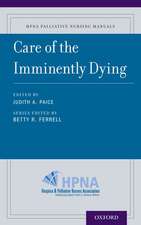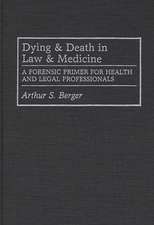When Life Ends: Legal Overviews, Medicolegal Forms, and Hospital Policies
Autor Arthur S. Bergeren Limba Engleză Hardback – 29 mai 1995 – vârsta până la 17 ani
Preț: 437.31 lei
Preț vechi: 603.95 lei
-28% Nou
Puncte Express: 656
Preț estimativ în valută:
83.69€ • 90.87$ • 70.30£
83.69€ • 90.87$ • 70.30£
Carte tipărită la comandă
Livrare economică 22 aprilie-06 mai
Preluare comenzi: 021 569.72.76
Specificații
ISBN-13: 9780275946203
ISBN-10: 0275946207
Pagini: 208
Dimensiuni: 156 x 235 x 23 mm
Greutate: 0.49 kg
Ediția:New.
Editura: Bloomsbury Publishing
Colecția Praeger
Locul publicării:New York, United States
ISBN-10: 0275946207
Pagini: 208
Dimensiuni: 156 x 235 x 23 mm
Greutate: 0.49 kg
Ediția:New.
Editura: Bloomsbury Publishing
Colecția Praeger
Locul publicării:New York, United States
Notă biografică
ARTHUR S. BERGER is the director of the International Institute for the Study of Death and an active member of the bioethics committee of a large metropolitan hospital. He is an attorney, educator, the author of six books, including Fear of the Unknown (Praeger, 1995), Dying and Death in Law and Medicine (Praeger, 1992), and the editor of three books including To Die or Not to Die? (Praeger, 1990), and Perspectives on Death and Dying (1989).
Cuprins
Foreword by Louis LembergPrefaceIntroductionLegal OverviewsRefusal of Life-Sustaining TreatmentLiving WillsSurrogate Decision MakingWithholding or Withdrawing Life-Sustaining TreatmentDo Not Resuscitate OrderPatient Self-Determination ActMedicolegal Forms and Hospital PoliciesInformed ConsentRefusal of Treatment by PatientsLiving WillsSurrogate Decision MakingWithholding or Withdrawing Life-Sustaining TreatmentDo Not Resuscitate OrdersPatient Self-Determination ActTable of CasesLegal Citations ReferencesIndex
Recenzii
Berger provides a unique blend of (1) a discussion of issues that have been problematic in the ethical consideration of end of life issues and (2) the provision of policies and forms that can be used by hospitals and other health care facilities. Very useful to health care institutions and to physicans regarding responsibilities and documentation in end of life situations. General; undergraduate; professional; two-year technical program students.
Although written primarily for physicians and hospital administrators, When Life Ends is certainly appropriate, and perhaps even essential reading for attorney (and their clients) working in health fields, estate planning, and elder law, as well as for social workers, clergy, and private citizens. End-of-life decisions will surely touch many of us either as caregivers, relatives, or patients. When Life Ends provides an objective framework for this often difficult, emotional subject. It is unreservedly recommended for law libraries, medical libraries, and social services collections in universities.
.a valuable resource and practical tool for physicians, nurses, medical staffs, legal professional, hospital administrators, and hospital bioethics committees because it provides (1) in-depth legal commentaries on the refusal of life-sustaining treatment, advance directives, surrogate decisionmaking, and the Patient Self-Determination Act; (2) more than seventy medical and legal documents to be used in connection with end of life decisions; and (3) hospital policies and procedures to suggest guidelines to hospital bioethics committees as they carry out their functions of developing policies and procedures to address end of life legal and ethical issues.
Although written primarily for physicians and hospital administrators, When Life Ends is certainly appropriate, and perhaps even essential reading for attorney (and their clients) working in health fields, estate planning, and elder law, as well as for social workers, clergy, and private citizens. End-of-life decisions will surely touch many of us either as caregivers, relatives, or patients. When Life Ends provides an objective framework for this often difficult, emotional subject. It is unreservedly recommended for law libraries, medical libraries, and social services collections in universities.
.a valuable resource and practical tool for physicians, nurses, medical staffs, legal professional, hospital administrators, and hospital bioethics committees because it provides (1) in-depth legal commentaries on the refusal of life-sustaining treatment, advance directives, surrogate decisionmaking, and the Patient Self-Determination Act; (2) more than seventy medical and legal documents to be used in connection with end of life decisions; and (3) hospital policies and procedures to suggest guidelines to hospital bioethics committees as they carry out their functions of developing policies and procedures to address end of life legal and ethical issues.












